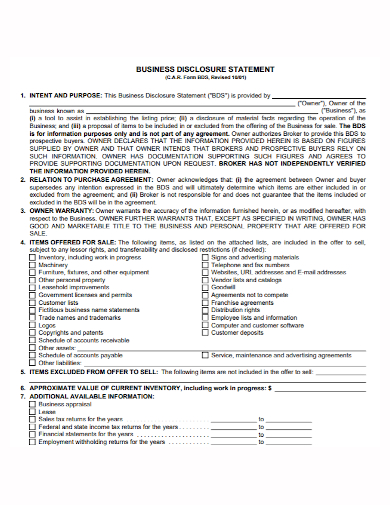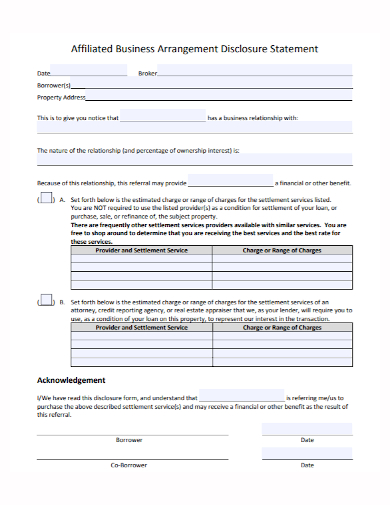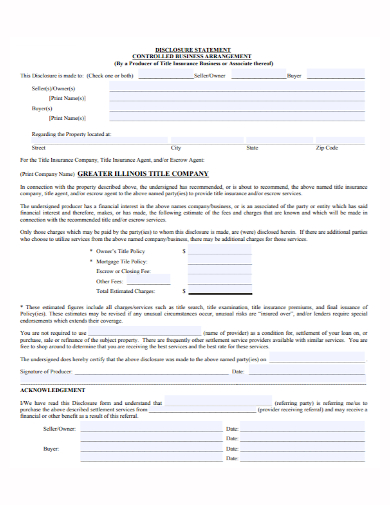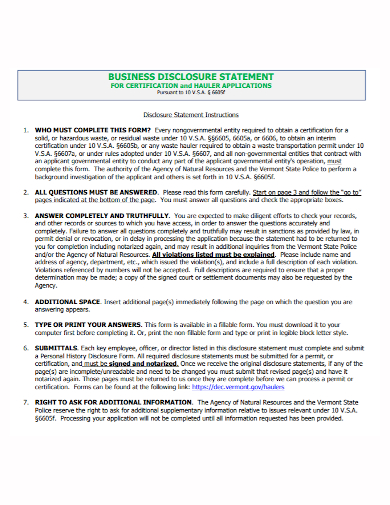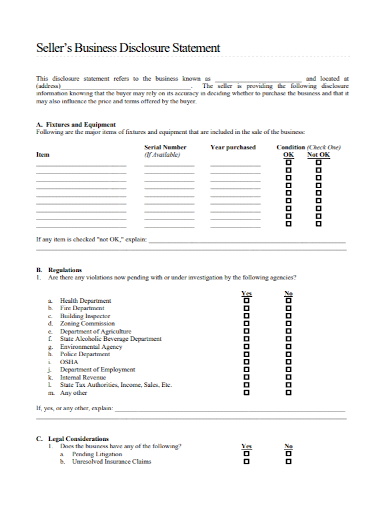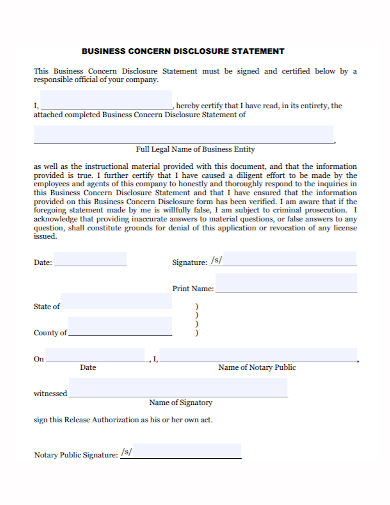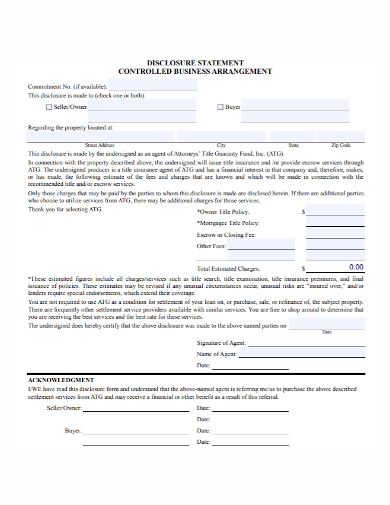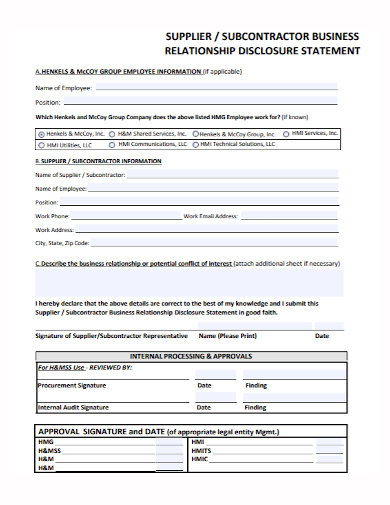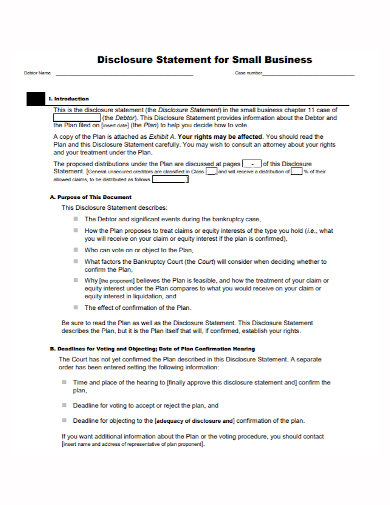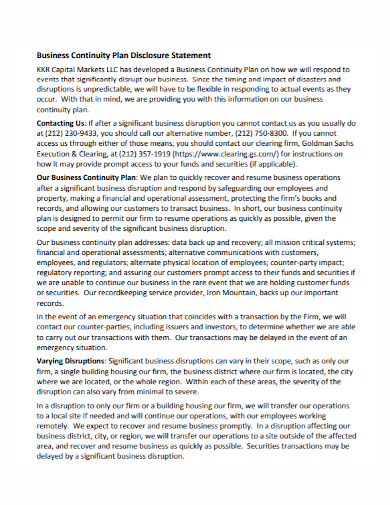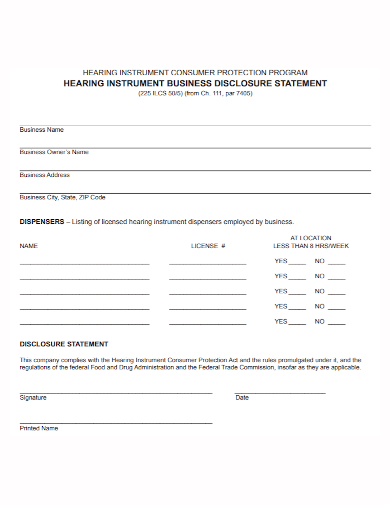In financial terms, disclosure refers to the act of making all relevant information of the company publicly available in a timely manner. Any piece of information about a company that can potentially influence an investor’s decision is considered relevant information. This includes facts, figures, dates, procedures, innovations, and so on. Any and all relevant data, whether advantageous or disadvantageous, positive or negative, fortunate or unfortunate, that could affect the business and, in turn, the decisions of its investors is included in any and every piece of information. Businesses and corporations are required to issue disclosures in the finance and investment world, disclosing all relevant information that could potentially influence an investor’s decision. It assists investors in making informed decisions about stocks and bonds.
10+ Business Disclosure Statement Samples
When entering into or renewing a lease, a landlord must provide the tenant with a disclosure statement. It summarizes key lease information so that the tenant can see the most important aspects of the agreement at a glance. A landlord must provide a disclosure statement and a copy of the proposed lease to the tenant no later than 14 days before the lease is signed. If the landlord makes changes to the copy of the proposed lease that was given to the tenant, the landlord must notify the tenant when giving them the updated lease no later than 14 days before the lease is signed.
1. Business Disclosure Statement
2. Affiliated Business Disclosure Statement
3. Disclosure Controlled Business Statement
4. Sample Business Disclosure Statement
5. Seller Business Disclosure Statement
6. Business Concern Disclosure Statement
7. Business Arrangement Disclosure Statement
8. Subcontractor Business Disclosure Statement
9. Small Business Disclosure Statement
10. Business Continuity Plan Disclosure Statement
11. Hearing Instrument Business Disclosure Statement
Importance of Disclosures
In the corporate and financial worlds, complete transparency is critical. Because of the following reasons:
- Ensures transparency – Investors can make more informed decisions when corporations’ operations and management are more transparent. It also reduces the risk of investor funds being manipulated or misused.
- Avoids any financial and economic crises – Increased transparency can help to prevent severe financial and economic crises. The Global Financial Crisis of 2008 is an excellent example of a financial/economic crisis caused in large part, if not entirely, by a lack of market transparency and accountability. It resulted in corporations and financial institutions mismanaging investors’ funds.
- Eliminates insider trading and window dressing – Agents with “inside information” in the market are prevented from misusing it for personal gain and profit if full disclosure is followed. It also eliminates the possibility of account manipulation and window dressing, further increasing market transparency.
- Allow the investors to have made more informed decisions – Businesses’ full disclosure of relevant information aids investors in making well-informed decisions. It reduces mistrust and speculation and boosts investor confidence by making them feel fully prepared to make investment decisions based on the information available.
- Reduces any uncertainty in the market – Full disclosure also reduces market uncertainty to a large extent. One of the most common causes of market volatility is uncertainty. When businesses in the market disclose everything they have, there is a higher level of overall certainty in the market, which reduces volatility and, to some extent, brings stability to the market.
FAQs
What are some limitations with disclosures?
There are some restrictions that apply to company disclosures. One of the drawbacks is the use of financial jargon. Investors typically find disclosures to be difficult to read because they contain verbose information full of financial and legal jargon. The language used is complex and difficult to understand, making it extremely difficult for non-industry investors to make informed investment decisions.
Why are disclosures important?
A research report‘s disclosure is just as important as a company’s financial report‘s footnotes. Corporations use footnotes to provide investors with information about specific financial line items in their financial statements.
What is a disclosure in financial statement?
Disclosure is an addition to an entity’s financial statements that serves as an explanation for activities that have had a significant impact on the entity’s financial results.
If you want to see more samples and formats, check out some business disclosure statement samples and templates provided in the article for your reference.
Related Posts
FREE 6+ Research Contribution Statement Samples in PDF | DOC
FREE 10+ Marketing Problem Statement Samples [ Strategy, Digital, Social Media ]
FREE 10+ Medical Problem Statement Samples [ Surgical, Nursing, Management ]
FREE 10+ Payoff Statement Samples in PDF | DOC
FREE 10+ Scholarship Statement of Purpose Samples in PDF | DOC
FREE 10+ Engineering Problem Statement Samples [ Software, Mechanical, Civil ]
FREE 30+ Information Statement Samples in PDF | MS Word
FREE 50+ Policy Statement Samples in MS Word | Google Docs | PDF
FREE 50+ Summary Statement Samples in PDF | MS Word
FREE 10+ Nursing School Personal Statement in PDF
FREE 9+ Mortgage Statement Samples and Templates in PDF
FREE 10+ Independent Subcontractor Statement Samples in MS Word | Google Docs | Apple Pages | PDF
FREE 10+ Trust Distribution Statement Samples in PDF
FREE 14+ Compliance Statement Samples & Templates in PDF | MS Word
FREE 10+ Extension Impact Statement Samples in PDF | DOC

